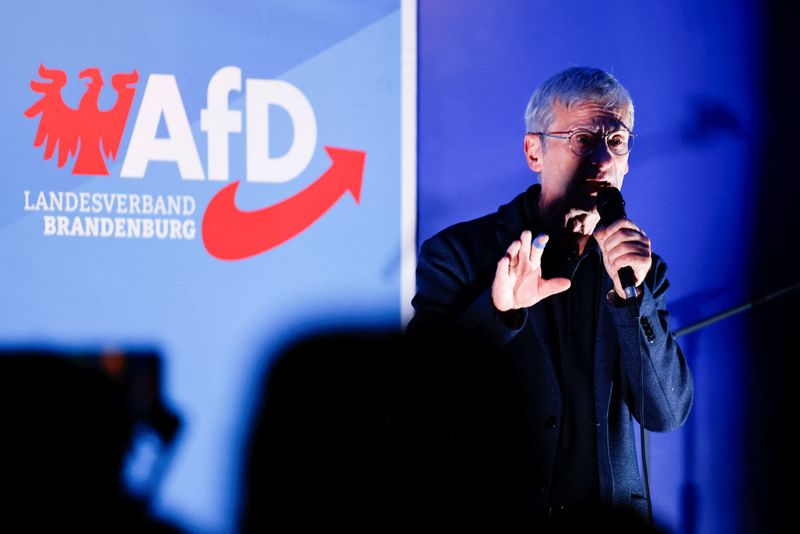By Riham Alkousaa and Sarah Marsh
BERLIN (Reuters) -German Chancellor Olaf Scholz's Social Democrats (SPD) looked set to fend off the far-right in a state election in Brandenburg on Sunday after trailing behind the Alternative for Germany (AfD) throughout the campaign, initial official figures showed.
The SPD, which has governed the state surrounding the capital Berlin since reunification in 1990, scored 30.9% of the vote, ahead of the far-right Alternative for Germany on 29.2%, in a last-minute comeback, according to provisional official results by the State Electoral Commissioner.
The success for the SPD could give Scholz a slight reprieve from party discussions about his suitability to be once more its chancellor candidate for the federal election scheduled for next September given his unpopularity with voters.
"A great result, very great for the SPD, and for all of us," Scholz was quoted as saying by Politico on the sidelines of his visit to the United Nations in New York on Sunday.
It is unlikely, however, to give him or his party a major boost given the popular, incumbent Brandenburg state SPD premier Dietmar Woidke had distanced himself from Scholz during the campaign and criticized the federal government's policies.
"Dietmar Woidke and his Brandenburg SPD have made a furious comeback in recent weeks," said SPD General Secretary Kevin Kuehnert.
"For us in the federal SPD, this evening, if things go well, the problems that lie ahead of us will not have gotten any bigger. But they have not gotten any smaller either," he said.
Three-quarters of those who voted for the SPD did not do so out of conviction but rather to fend off the AfD, according to the exit poll published by broadcaster ARD. Turnout rose to 73% from 61% five years ago, according to ZDF.
The SPD is polling just 15% at national level, down from the 25.7% it scored in the 2021 federal election. That is behind the AfD on around 20% and opposition conservatives on 32%.
All three parties in Scholz's ideologically heterogeneous coalition combined are currently polling at around 30%, less than the conservatives alone.
The coalition has come under fire for its constant bickering and for its handling of immigration. In the formerly Communist-run East, many voters are also critical of its delivery of weapons to Ukraine to help it fend off Russia's full-scale invasion.
NO TIME FOR COMPLACENCY
The vote in Brandenburg comes three weeks after the Russia-friendly AfD became the first far-right party to top a state election in Germany since World War Two, in Thuringia. It also performed strongly in neighboring Saxony, coming hot on the heels of the conservatives in second place.
Woidke warned against complacency, noting the AfD was still gaining momentum. Provisional official results suggested it had gained 5.7 percentage points since the last Brandenburg election in 2019.
AfD co-leader Tino Chrupalla noted the AfD had made strong gains among young voters - a trend that was reflected for far-right parties across Europe in the EU elections in June.
The new leftist Alliance Sahra Wagenknecht was on track to come in third place, on 12% according to the poll, ahead of the conservatives on 11.6%, underscoring the ongoing upheavals in Germany's political landscape making predictions tricky.
The Greens, one of the junior partners in Scholz's coalition at a federal level, came in on 4.1%, just below the 5% threshold to automatically make it into state parliament.

The result achieved by the other junior coalition partner, the Free Democrats (FDP), was too insignificant to be reflected in the poll.
With the Greens failing to re-enter Brandenburg state parliament, Woidke's SPD cannot continue its coalition with the CDU and Greens. Projections also show that the SPD and CDU lack a majority on their own.
